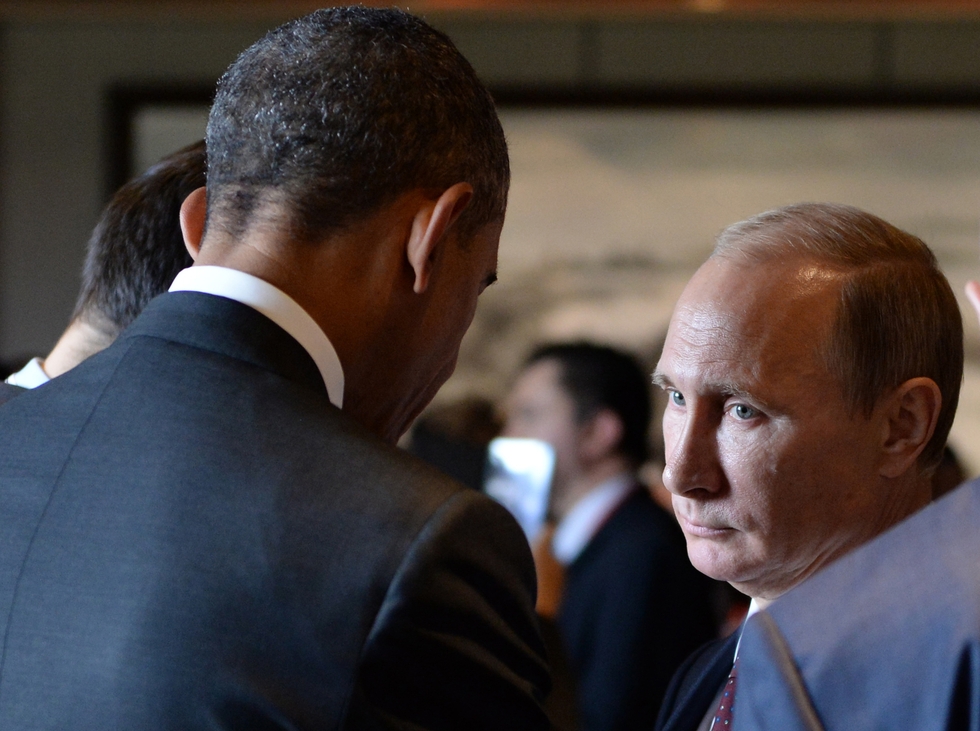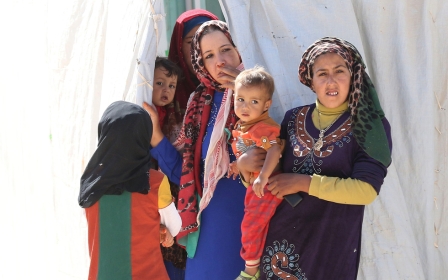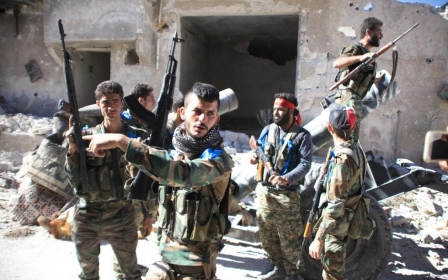US says it is not 'giving up' in Syria

NEW YORK, United States – Amid fears of a rising death toll in a Russian-backed advance on eastern Aleppo, the last "moderate" rebel urban stronghold in Syria, US official Mark Toner assured Middle East Eye that Washington is not “giving up” on its role in the conflict.
Toner, the US State Department’s deputy spokesman, tried to allay concerns that Washington – frustrated by repeated failures to broker a truce in Syria – was effectively ceding its role in the war as US President Barack Obama’s term winds down.
“I would not say this is a giving up or walking away from our very serious concern and very serious engagement about Syria,” Toner told MEE on Wednesday, adding that an extra $364m in Syrian aid this week showed Washington’s commitment.
He expressed concern, however, that Russia was undermining peace efforts in Aleppo and spoke of “possible next steps” US officials were considering. “But we can’t delude ourselves in continuing a process that bears no fruit,” he told MEE.
Amid talks, war rages on
As he spoke, fears of more civilian misery grew on Wednesday after two hospitals were blasted during a government advance on the northwest Syrian city’s rebel-held eastern zones that could prove pivotal in the tumultuous civil war.
Russian or Syrian warplanes knocked a key Aleppo hospital out of action, staff said. Shelling damaged another in a week-long siege of the city that has buried a US-Russia ceasefire deal that was months in the making.
"We can’t delude ourselves in continuing a process that bears no fruit" - Mark Toner, US State Department’s deputy spokesman
In spite of a phone call between US Secretary of State John Kerry and his Russian counterpart, Sergey Lavrov, it appeared unlikely that the US would try anything beyond the diplomatic approach that is being increasingly criticised for failing the Syrians.
Kerry urged Moscow’s top diplomat to stop using “incendiary and bunker-buster bombs” in built-up neighbourhoods and hitting hospitals and water supplies that are vital to some 250,000 trapped residents, according to the State Department.
Syrian President Bashar al-Assad’s government, backed by Russian air power, Iranian ground forces and Shia fighters from Iran, Iraq and Lebanon, has launched a major assault to crush the rebels’ last big urban stronghold, killing hundreds of people already.
Carlos Francisco, from the aid group Doctors Without Borders, which supported the two hospitals, described it as the “bloodiest indiscriminate bombing since the beginning of the war”. Only seven surgeons were left working in the area, he added.
Speaking at the UN, British envoy Peter Wilson blamed Russia and the Syrian government for a “horrific state of affairs,” adding: “It is impossible to see how one can return to political talks while a campaign of violence of this nature is being waged.”
The UN agency for children, UNICEF, warned that at least 96 children had been killed and another 223 wounded since Friday. The group’s deputy director, Justin Forsyth, said the city’s youngsters were “trapped in a living nightmare”.
GOP insistent on doing more
Republican lawmakers have repeatedly called on the Obama administration to take firmer action against Assad, backing plans for destroying warplanes and imposing a no-fly zone to stop his aircraft from barrel-bombing civilian areas.
Obama leads an international air coalition bombing the Islamic State (IS) group, but is reluctant to ramp up America’s footprint in Syria to anything beyond arming handpicked rebels and deploying small numbers of military advisers.
Bob Corker, a Republican who chairs the Senate Foreign Relations Committee, blamed post-ceasefire mayhem on weak US resolve. “Russia has known all along that there was nothing to back up empty words” from the US, Corker said.
Republican lawmaker Ed Royce, who chairs the House Foreign Affairs Committee, urged Obama to drop his objections to a draft law that would place new sanctions on Assad’s backers and kick-start war crimes probes in Syria.
Antony Blinken, a deputy US secretary of state, was set to brief Corker’s committee on Thursday. On Wednesday, Blinken outlined plans to help Kurdish forces push IS militants out of their strongholds in Raqqa and Dabiq in Syria and Mosul in Iraq.
The UN Security Council will meet at the same time to discuss the human suffering in Aleppo. Western envoys have repeatedly called for war crime probes in Syria, but veto-wielding Russia has often rendered the body deadlocked.
Royce and Corker declined MEE’s interview requests, but analysts described a US administration that was struggling to advance a cogent policy in Syria and was unlikely to alter course in the twilight of Obama’s presidency.
‘US policy inaction has reduced military options’
Christopher Harmer, a former US Navy officer, said the White House missed its chance to undertake “low-risk” military action in Syria and destroy Assad’s air force, before Russia intervened at the end of September 2015.
“With Russian personnel stationed at Syrian air bases, the option of destroying the Syrian Air Force is no longer viable. Likewise, establishing a no-fly zone would require cooperation with Russia, which is unlikely, or risk escalation, which is not justified,” Harmer, an analyst for the Institute for the Study of War, a think-tank, told MEE.
“US policy inaction has reduced our military options from relatively low-risk options to extremely high-risk options. Further inaction will likely lead to more deaths, more refugees, and further regional instability.”
"With Russian personnel stationed at Syrian air bases, the option of destroying the Syrian Air Force is no longer viable" - Christopher Harmer, former US Navy officer
Faysal Itani, an analyst with the Atlantic Council think-tank, said Obama’s “total refusal to use force to extract a price for regime violations” undercut Kerry’s peace-making efforts and the top US diplomat’s “talks cannot lead anywhere”.
His approach therefore hinges “completely on Russian goodwill” and is “not backed by any leverage,” Itani told MEE. “The regime will continue to break ceasefires if it offers a military advantage, and Russia will continue to accept this.
“I don’t expect this to change before [Obama leaves office on] January 20th, seeing as it is based on a pillar of White House foreign policy: avoiding complex entanglements in Middle East conflicts, especially if they detract from counterterrorism efforts and the viability of the nuclear agreement with Iran,” Itani added.
Evan Barrett, an adviser at the Coalition for a Democratic Syria, has lobbied the White House to ground Syria’s air force. Still, he has largely stopped approaching an administration that is winding down, as Americans prepare to elect a new president on 8 November.
He is hopeful that the Democratic nominee, Hillary Clinton, would be more proactive in Syria were she to win the ballot. Her Republican rival, Donald Trump, with his “very amorphous” and unpredictable foreign policy, was “harder to engage with,” he added.
“We mainly work with Congress at this point, where there’s broad-based support for doing more in Syria – but they can’t do it on their own,” Barrett told MEE. “There’s just a question of how chaotic and terrible things will be by the time the next president gets in office.”
This article is available in French on Middle East Eye French edition.
New MEE newsletter: Jerusalem Dispatch
Sign up to get the latest insights and analysis on Israel-Palestine, alongside Turkey Unpacked and other MEE newsletters
Middle East Eye delivers independent and unrivalled coverage and analysis of the Middle East, North Africa and beyond. To learn more about republishing this content and the associated fees, please fill out this form. More about MEE can be found here.




